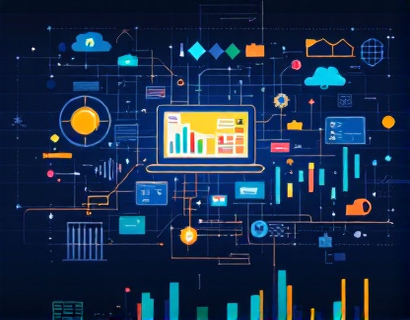Unlocking the Potential of AI and Crypto: A New Era of Digital Productivity
The integration of Artificial Intelligence (AI) and cryptocurrency technologies is revolutionizing the way we approach digital productivity. This convergence is not just a trend but a transformative shift that is redefining efficiency and task management in the modern workplace. For tech innovators and early adopters, the possibilities are vast and exciting. This article delves into the synergy between AI and cryptocurrency, exploring how these technologies are being harnessed to create innovative digital solutions that enhance productivity and streamline everyday tasks.
The landscape of digital tools and applications is rapidly evolving, driven by advancements in AI and the adoption of blockchain technology. Tech-savvy individuals and organizations are at the forefront of this change, seeking out cutting-edge solutions that can give them a competitive edge. The fusion of AI and cryptocurrency is particularly promising, as it combines the intelligence and automation capabilities of AI with the security, transparency, and decentralization offered by blockchain.
AI-Powered Task Management
One of the most immediate impacts of AI in the workplace is in task management. AI-driven tools can analyze vast amounts of data to optimize workflows, predict bottlenecks, and automate repetitive tasks. For instance, AI algorithms can learn from user behavior to suggest the most efficient sequences for completing tasks, reducing the time spent on decision-making and increasing overall productivity. These tools can also integrate with existing calendar and scheduling applications to ensure that deadlines are met and resources are allocated effectively.
Moreover, AI can enhance collaboration by providing real-time insights and recommendations. Team members can receive intelligent suggestions on how to improve project outcomes, based on historical data and current project dynamics. This not only streamlines communication but also fosters a more collaborative and efficient work environment. AI-powered chatbots and virtual assistants further augment this by handling routine inquiries and tasks, allowing human team members to focus on higher-value activities.
Cryptocurrency and Decentralized Applications
Cryptocurrency, on the other hand, brings a new dimension to digital productivity through its decentralized nature. Blockchain technology ensures that transactions are secure, transparent, and tamper-proof, which is crucial for maintaining trust in digital interactions. Decentralized applications (dApps) built on blockchain platforms offer a range of benefits, from secure data storage to decentralized finance (DeFi) solutions that enable new forms of investment and lending.
In the context of productivity, cryptocurrency can facilitate seamless and secure transactions within and between organizations. Smart contracts, self-executing contracts with the terms directly written into code, can automate complex processes such as payment settlements, contract enforcement, and supply chain management. This reduces the need for intermediaries, lowers transaction costs, and speeds up processes, all of which contribute to higher productivity.
Enhancing Security and Privacy
Security and privacy are paramount in the digital age, and the combination of AI and cryptocurrency addresses these concerns effectively. AI can detect and mitigate security threats in real-time, using machine learning algorithms to identify patterns and anomalies that indicate potential breaches. This proactive approach to security helps protect sensitive data and ensures that digital transactions remain secure.
Cryptocurrency, with its cryptographic techniques, provides an additional layer of security. Blockchain's immutable ledger ensures that once a transaction is recorded, it cannot be altered or deleted. This transparency and immutability are invaluable for maintaining trust and integrity in digital interactions. Furthermore, privacy-focused cryptocurrencies and zero-knowledge proofs enable users to transact without revealing sensitive information, enhancing privacy while maintaining security.
Optimizing Resource Allocation
The integration of AI and cryptocurrency also optimizes resource allocation in the workplace. AI can analyze usage patterns and predict resource needs, ensuring that computational power, storage, and other resources are used efficiently. This is particularly beneficial for organizations that rely heavily on data-intensive applications, such as those in the fields of research, finance, and healthcare.
Cryptocurrency-based marketplaces can further enhance resource allocation by connecting suppliers and consumers of computational resources in a decentralized manner. These platforms allow individuals and organizations to rent out their unused computing power, creating a peer-to-peer market that maximizes resource utilization and reduces waste. This not only lowers costs but also promotes sustainability by making better use of existing resources.
Fostering Innovation and Creativity
Beyond efficiency and security, the combination of AI and cryptocurrency fosters an environment conducive to innovation and creativity. AI tools can assist in brainstorming and idea generation by analyzing trends, suggesting novel combinations of concepts, and providing data-driven insights. This can be particularly useful in creative industries, where the ability to generate and evaluate ideas quickly is crucial.
Cryptocurrency and blockchain can also support innovative business models and funding mechanisms. Initial Coin Offerings (ICOs) and Initial DEX Offerings (IDOs) provide a way for startups to raise capital directly from investors, bypassing traditional financial intermediaries. This democratizes access to funding and allows for more diverse and innovative projects to gain traction. Additionally, tokenized rewards and incentive programs can motivate contributors and users, fostering a community-driven approach to innovation.
Challenges and Considerations
While the potential benefits are significant, there are also challenges and considerations to keep in mind. The complexity of integrating AI and cryptocurrency technologies requires a skilled workforce capable of navigating these advanced systems. Organizations must invest in training and development to ensure their teams can effectively leverage these tools.
Regulatory environments are another critical factor. As AI and cryptocurrency continue to evolve, regulations are still catching up. Compliance with existing laws and the navigation of new regulatory frameworks are essential to avoid legal pitfalls. Organizations should stay informed about regulatory developments and work closely with legal experts to ensure compliance.
Future Prospects
The future of AI and cryptocurrency in enhancing digital productivity is bright. As technology continues to advance, we can expect even more sophisticated tools and applications that further integrate these technologies. The development of more user-friendly interfaces and the standardization of protocols will make it easier for a broader range of users to adopt and benefit from these innovations.
Moreover, the convergence of AI, cryptocurrency, and other emerging technologies such as the Internet of Things (IoT) and 5G networks will create a highly interconnected and intelligent digital ecosystem. This ecosystem will not only enhance productivity but also enable new forms of collaboration and innovation that were previously unimaginable.
In conclusion, the integration of AI and cryptocurrency is not just a technological trend but a fundamental shift in how we approach digital productivity. For tech innovators and early adopters, embracing these technologies can lead to significant improvements in efficiency, security, and innovation. As the landscape continues to evolve, staying informed and adaptable will be key to harnessing the full potential of this transformative combination.











































